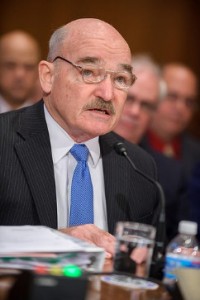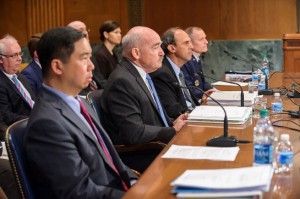
Senate Hearing: DoD’s Preparation for Climate Change’s Impacts on Security
The Senate Appropriations Subcommittee on Defense met on May 21st, 2014 to receive testimony from several Department of Defense officials on the Department’s Operational Energy programs and the incorporation of climate change into strategic planning. The DoD officials spoke mostly of increasing efficiency, adaptability, and flexibility in operational energy programs. Assistant Secretary of the Navy Dennis McGinn’s opening statement detailed the Navy’s plan to purchase domestically produced alternative fuel to minimize the uncertainties connected to the global petroleum supply chain and account for price volatility.
 McGinn testified that the Navy will start integrating advanced alternative fuels into its normal supply chain next year at a cost that is competitive with petroleum. These fuels will have “drop-in” capability, allowing current infrastructure and vehicles to use the fuels without modification. In response to a question posed by Subcommittee Vice Chairman Thad Cochran about reducing the environmental impact of training and operating bases in the U.S., McGinn cited the Navy’s increased use of simulations to reduce fuel consumption and curb carbon emissions. McGinn also highlighted how the Navy is improving efficiency through new technologies like stern flaps on ships that reduce fuel use as well as improving the culture of the Navy to get sailors and marines to use energy wisely.
McGinn testified that the Navy will start integrating advanced alternative fuels into its normal supply chain next year at a cost that is competitive with petroleum. These fuels will have “drop-in” capability, allowing current infrastructure and vehicles to use the fuels without modification. In response to a question posed by Subcommittee Vice Chairman Thad Cochran about reducing the environmental impact of training and operating bases in the U.S., McGinn cited the Navy’s increased use of simulations to reduce fuel consumption and curb carbon emissions. McGinn also highlighted how the Navy is improving efficiency through new technologies like stern flaps on ships that reduce fuel use as well as improving the culture of the Navy to get sailors and marines to use energy wisely.
According to McGinn, the Navy has also made strides in water consumption reduction. The Navy and Marine bases in California have reduced their water consumption overall by 25% over the last 5 years and plan to lower that number by an additional 20%. He went on to suggest large scale desalination plants powered by renewable energy to remedy the looming possibility of water shortages in the future. These shortages, in combination with natural disasters and other adverse effects of climate change, can destabilize fragile societies and even lead to regional war. It is for this reason that McGinn named climate change a serious threat to U.S. security.
A large portion of the hearing was devoted to a discussion of the Arctic and the implications of the shrinking ice cap. Brigadier General Kenneth Lewis spoke about the new challenges and opportunities presented by the opening up of the Arctic Ocean. He acknowledged that increasing human activity in the Arctic creates the potential for new security challenges but sees the opening of the region as an opportunity to work collaboratively with allies to ensure regional security and American interests. Lewis went on to say that recent reporting has overemphasized changes in the security landscape and designated the Arctic as a low level security threat. He stressed that “we must balance the risk of having inadequate capabilities and insufficient capacity with the cost of making premature and/or unnecessary investments.”
General Lewis’s statement is contradicted by a G.A.O. report released this week detailing the lack of a formal U.S. government strategy and process for tracking progress in achieving Arctic goals. Senator Richard Shelby of the subcommittee expressed concern that the U.S might fall behind Russia in Arctic infrastructure to process the potentially vast oil and natural gas reserves revealed by melting Arctic ice. When Deputy Assistant Secretary of Defense for Strategy Daniel Chiu spoke of the need to balance being proactive in the region with a potentially decades-long melting process, ranking subcommittee member Lisa Murkowski countered that in most cases building infrastructure is itself a decades-long process.
You can find a link to the testimonies here and a video of the hearing here.
Read about the DoD’s Operational Energy Programs here.
Read the ASP Report “Advance Biofuels and National Security”
Read the ASP Report “American Security: the Impact of Climate Change”
Read the ASP Report “The Arctic – America’s Last Energy Frontier”
Read the ASP Report “Energy Development in the Arctic – Threats and Opportunities”







[…] sign of rising animosity between the bitter rivals in recent weeks. On Our Flashpoint Blog Senate Hearing: DoD’s Preperation for Climate Change’s Impact on SecurityColin TaylorThe Senate Appropriations Subcommittee on Defense met on May 21st, 2014 to receive […]
[…] of its domestic fuel consumption by 2016, and in the Navy, which Assistant Secretary Dennis McGinn recently testified will start integrating advance biofuels in 2015. More complex solutions included developing […]